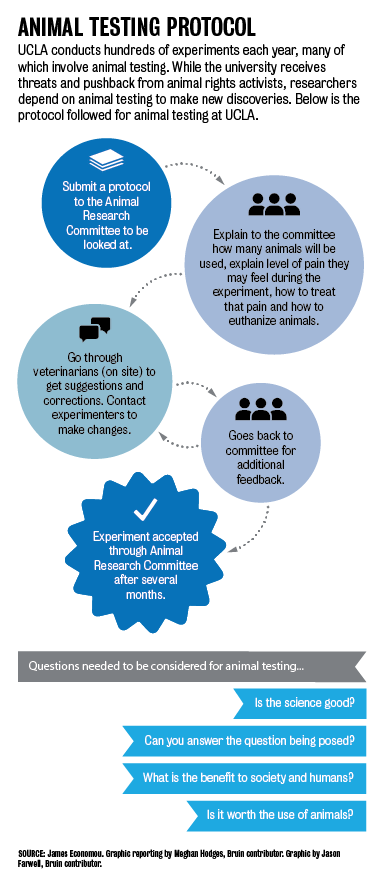Research using animals continues to spark controversy at UCLA

By Meghan Hodges
Nov. 24, 2015 1:54 p.m.
UCLA is one of several research universities that test experimental procedures on laboratory animals to develop medical procedures and treatments.
Researchers at universities must adhere to regulations and federal laws, but animal rights activists often criticize these institutions for failing to treat animals humanely, said James Economou, vice chancellor for research at UCLA.
Earlier this month, the Animal Justice Project, an international animal rights organization, partnered with the Taxpayers Protection Alliance to compile a report that concluded UCLA uses the third-most government funding of all universities to conduct drug addiction experiments on animals.
Julia Orr, an author of the report and an Animal Justice Project researcher, said she collected a list of universities and experiments that receive large amounts of funding from the government for animal testing, using publicly available data from the National Institute of Health.
“We found these animals in labs are being used for really invasive and unnecessary experiments,” Orr said. “In one experiment, the rats didn’t behave how the experimenter (expected), so they killed them and threw them in the trash.”
Economou said he thinks animal rights activists are opposed to research involving animals, but are open to receiving a treatment found though animal research. He added he thinks activists create propaganda to create doubt about animal research and its importance.
Activists have threatened and harassed faculty members over the years for testing experimental procedures on animals. In March 2009, activists firebombed a faculty member’s car, Economou said.
Orr’s report claimed UCLA faculty members J. David Jentsch, a professor in the psychology department, and Christopher Evans, a professor in psychiatry and behavioral science, receive the most money at UCLA in government grants that fund animal experimentation.
Orr said she hopes the report will educate the public about how animals are treated in labs, and bring awareness to the malpractice in animal testing facilities.
In his lab, Evans said he conducts experiments in order to further understand the effects of opioid drugs, such as morphine and heroin, at molecular and behavioral levels. He added he can better understand how receptors affect human behavior through the use of animal models, because the receptors within mice strongly resemble those in humans.
Researchers who experiment on animals must undergo protocol submission and review, facility inspections and animal care and use evaluations, according to the Office of Animal Research Oversight’s website.
Researchers must present a protocol explaining their planned experiment to an Animal Research Committee, which consists of scientists, veterinarians and members of the public, Evans said. The protocol details how many animals will be used, their role in the experiments, what level of pain they may feel and what will be done to alleviate the pain, he added.
Veterinarians then comb through the protocol to suggest changes that improve the treatment of the animals, Evans added.
Economou said the committees only approve proposals that demonstrate the use of animals in the experiment is necessary and valuable.
“If a proposal is approved, and is worth the use of animals as subjects of research, these experiments are carefully regulated and scrutinized,” Economou said.
UCLA researchers have recently used animal testing to enable rats to walk after spinal damage, slow the effects of Parkinson’s disease and shrink tumors in mice, according to a UCLA press release.
Economou added animal rights activists are entitled to their views regarding the treatment of animals, but must understand the benefits of these experiments to society.
“As researchers, we (aim to) conduct research and make discoveries that improve the health of society,” he said.


